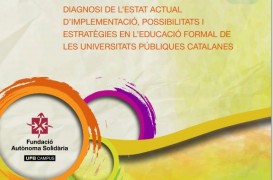Published a report on the status of education for development at universities with the participation of the ACUP
Fundació Autònoma Solidària (FAS) has published the report “Education for Development at the University. Promoting critical and engaged education in undergraduate studies” as a result of a study that collects and analyses data from the eight Catalan universities belonging to the Association of Catalan Public Universities (ACUP). The diagnosis identifies the state of affairs and the possibilities of consolidating contents that incorporate the perspectives of education for development (EfD) into formal university studies. It also includes a compilation of good curricular integration practices with an approach to EfD and a series of recommendations for advancing in their introduction.
What is the status of the implementation of EfD at universities?
The report shows that the statutes of the 8 universities refer to the foundationss of education for development as guiding principles or purposes that should guide educational action, such as progress in the eradication of poverty, the desire to promote critical thinking among students, the defence of human rights or the promotion of sustainable development. With regard to the universities’ social policies, the study shows that the centres have demonstrated an interest in dealing with social issues, but outside the context of formal education. Finally, the diagnosis analyses the syllabuses of the 8 universities to identify the possibilities of implementing EfD and concludes that “the current design of syllabuses shows potential for the incorporation of EfD in many subjects and degrees”. In fact, it includes more than 580 subjects related to themes of critical education.
The opinions of students, degree coordinators and professionals
The diagnosis also incorporates the opinions of 892 students at UAB who took part in a survey on their expectations regarding their time spent at university and their position on the approaches addressed from the perspective of EfD. More than 75% expressed that they “would like to have or have had the ability to analyse globally the complex phenomena in the world today”.
The opinion of the coordinators of 5 UAB degrees is also included in the report, who state the importance of incorporating training on critical thinking but also express the need to balance it with specific contents of the courses. At the same time, the report contains opinions that propose that today the incorporation of EfD contents depends on the will of the teaching staff. However, says the report, “in all cases they identify specific themes that already take sustainability and critical citizenship into account in their content”. They also point out End of Degree Projects as an opportunity to introduce perspectives of critical education.
Finally, the report includes the voice of the teaching staff, other university stakeholders and social organizations with expertise on the topic, providing the results of the first seminar “EfD in undergraduate studies. Building a critical and engaged university”, held in Barcelona in January 2015.
Good EfD practices
The diagnosis captures 9 educational actions introducing the perspective of EfD in formal university education, including the project GDEE – Global dimension in engineering education, at UPC, UdL’s Classrooms against poverty experience, UAB’s Minor in Sustainable Development and Global Citizenship, and URV’s Environmental legal Clinic through Service Learning (SL) methodology.
The initiative to develop the diagnosis falls within the project “Promoting Education for Development at the University”, coordinated by the FAS and drafted in collaboration with: UB Solidarity Foundation, UdG’s Cooperation for Development Office, UdL’s Development and Cooperation Office (ODEC), UOC Campus for Peace, the Center of Cooperation and Development (CCD), of UPC, UPF Solidària and ACUP, and the support of Barcelona City Council and the Catalan Agency for Development Cooperation.
